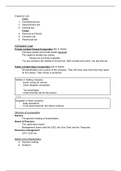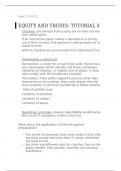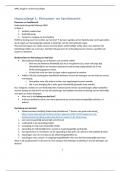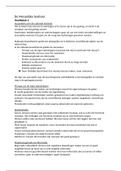● Sex
- Sexual anatomy and sexual behavior (behavior that produces arousal and
increases the chance of orgasm)
● Cultivation theory
- The finding that what people see on television represents the mainstream of
what is happening in society
● Framing theory (agenda setting)
- News reporters decide what to report and what to ignore within the stories
themselves
● Social learning (from the media)
- Characters in the media (TV, etc.) may serve as models whom we imitate
- Social Cognitive Theory states that the media affects behaviours (through
imitation, modelling and identification) and thoughts
● Selectivity (in the media)
- People pay attention to certain media messages and not others
● Reinforcing Spiral Theory
- Social identities influence the media we watch and subsequently influence
(reinforce) our beliefs and identity again
● Differential Susceptibility Model
- Not everyone reacts to the media in the same way
● Familismo
- Support, loyalty, solidarity
● Machismo
- An emphasis on male strength and dominance
● Marianismo
- The "ideal" traditional Latin American woman who is patient, loving, gentle,
and willing to suffer in silence
● Sexual health
- A state of physical, emotional, mental, and social well-being in relation to
sexuality
● Sexual rights
- Basic, inalienable rights regarding sexuality, both positive and negative, such
as rights to reproductive self-determination and sexual self-expression and
freedom from sexual abuse and violence
,● Sociobiology
- The application of evolutionary biology to understanding the social behaviour
of animals (e.g. men pay for dates because it shows ability to provide for
family)
● Sexual selection
- Selection creates differences between males and females
- 1. Competition among members of one gender for mating access to members
of other gender
- 2. Preferential choice by members of one gender for certain members of other
gender
● Criticisms of sociobiology
- 1. Objections to implied biological determinism
- 2. Too much focus on individual survival
- 3. Too much focus on reproductive function of sex
- 4. Recent Research does not support some of the evidence that is cited in
support of the theory
● Evolutionary psychology
- Focuses on psychological mechanisms that have been shaped by natural
selection
● Criticisms of evolutionary psychology
- 1. Men and women don't really differ in strategies (prefer long-term strategies)
- 2. Every characteristic must have some adaptive significance
- 3. Most participants are Western (Not generalizable)
- 4. Strategies are not constant
● Gender-Neutral Evolutionary Theory
- It is not adaptive for humans to display fixed sexual/gender behavior when we
live in such varied environments (humans evolved to be flexible and
adaptible); individuals who change their reproductive strategies depending on
the situation have the most reproductive success
● Freud's stages of psychosexual development
- Oral stage (0-1), anal stage (2), phallic stage (3-5; oedipus complex and
electra complex), latency stage (5-adolescence), genital stage (puberty
onwards)
● Oedipus complex
- The boy loves his mother and desires her sexually and hates his father. Later,
his hostility wears off due to castration anxiety
● Electra complex
- The girl desires her father (impregnation, to make up for her unobtainable
penis; penis envy). Proof that women are inferior to men according to Freud
,● Criticisms of Freud
- Little empirical evidence
- Cannot be evaluated scientifically
- Based on his own patients (may be signs of abnormal sexual development)
- Problematic
- Insufficient importance to environment/learning
● Learning Theory
- Sexual behavior is learned, uses principles of classical and operant
conditioning; positive/negative reinforcement
● Behaviour Modification
- Set of techniques, based on principles of classical or operant conditioning that
are used to change or modify human behavior (modifying problematic sexual
behaviors) e.g. olfactory aversion therapy
● Social learning theory
- The theory that we learn social behaviour by observing and imitating and by
being rewarded or punished
● Social exchange theory
- Maximise reward and minimise cost in personal relationships
● Matching hypothesis
- The tendency to develop relationships with people who are approximately as
attractive as we are
● Social Exchange Criticism
- 1. Some people believe love is not and should not be about what we can get
out of it
- 2. Downplays other motivations
● Schema
- A concept or framework that organises and interprets information
● Gender schema theory
- We all have a cognitive structure that contains gender-specific information
● Social Constructivist theories
- Behaviours and types of people are social constructions. Categories are
developed by groups and subcultures and then applied to objects in the world
around them
● Feminist theory
- Gender signals status in culture (dimension of inequality); women's sexuality
has been controlled by men, suppressed
, ● Intersectionality
- We should simultaneously consider a person's multiple group memberships
and identities including gender, race, social class and sexual orientation to
understand a person's identity and sexuality
● Performativity of gender
- We perform sexuality/gender based on society's norms
● Queer theory
- Questions the social categorization of sexuality and gender
● Symbolic interaction theory
- Human nature and the social order are products of symbolic communication
among people (role taking; we are able to anticipate which behaviour will lead
to which goal); people are able to manipulate symbolic communication to
achieve their desires goals
● Criticism of symbolic interaction theory
- Emphasises rational conscious thought (sexuality might not rely on rational
thoughts)
- Portrays humans are other-directed individuals
- We don't always consciously take roles on and communicate to achieve
agreement
● Sexual scripts
- Sexual behavior is a result of elaborate prior learning that teaches us an
etiquette of sexual behavior e.g. kissing, breast touching, genital touching,
mouth-genital stimulation, intercourse and orgasm
● 3 Basic assumptions of sociological research
- 1. Every society regulates the sexuality of its members
- 2. The appropriateness or inappropriateness of a particular sexual behavior
depends on the institutional context within which it occurs
- 3. Basic institutions of society (e.g. law, religion, family, medicine) affect the
rules governing sexuality
● Procreational ideology (religion)
- Sex is only for reproduction (homosexuality, premarital sex and extramarital
sex are wrong)
● Relational ideology
- By the 1970s, some people were arguing that sex outside of marriage, if in
the context of a loving relationship, was permissible, as was same-sex sexual
activity, again if the relationship was a loving one.
● Medicalization of sexuality
- Biomedical model dominates contemporary sex research
- 1. Certain behaviours or conditions are defined in terms of health and illness










